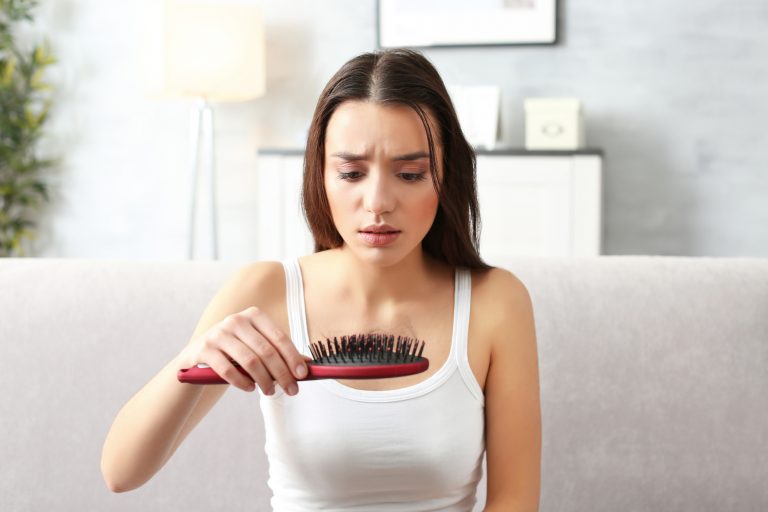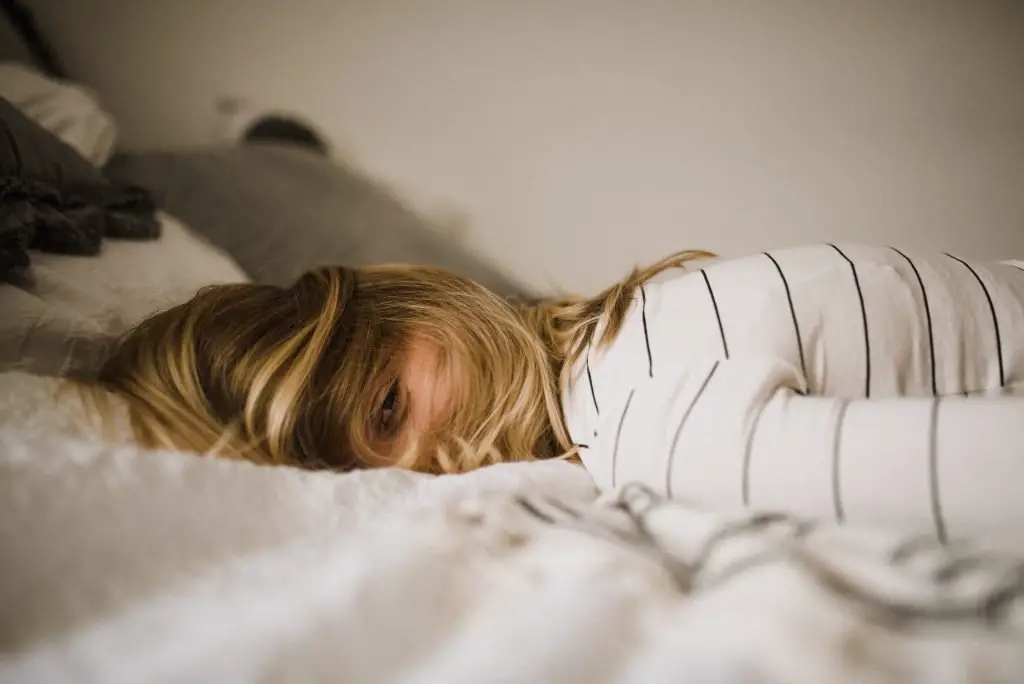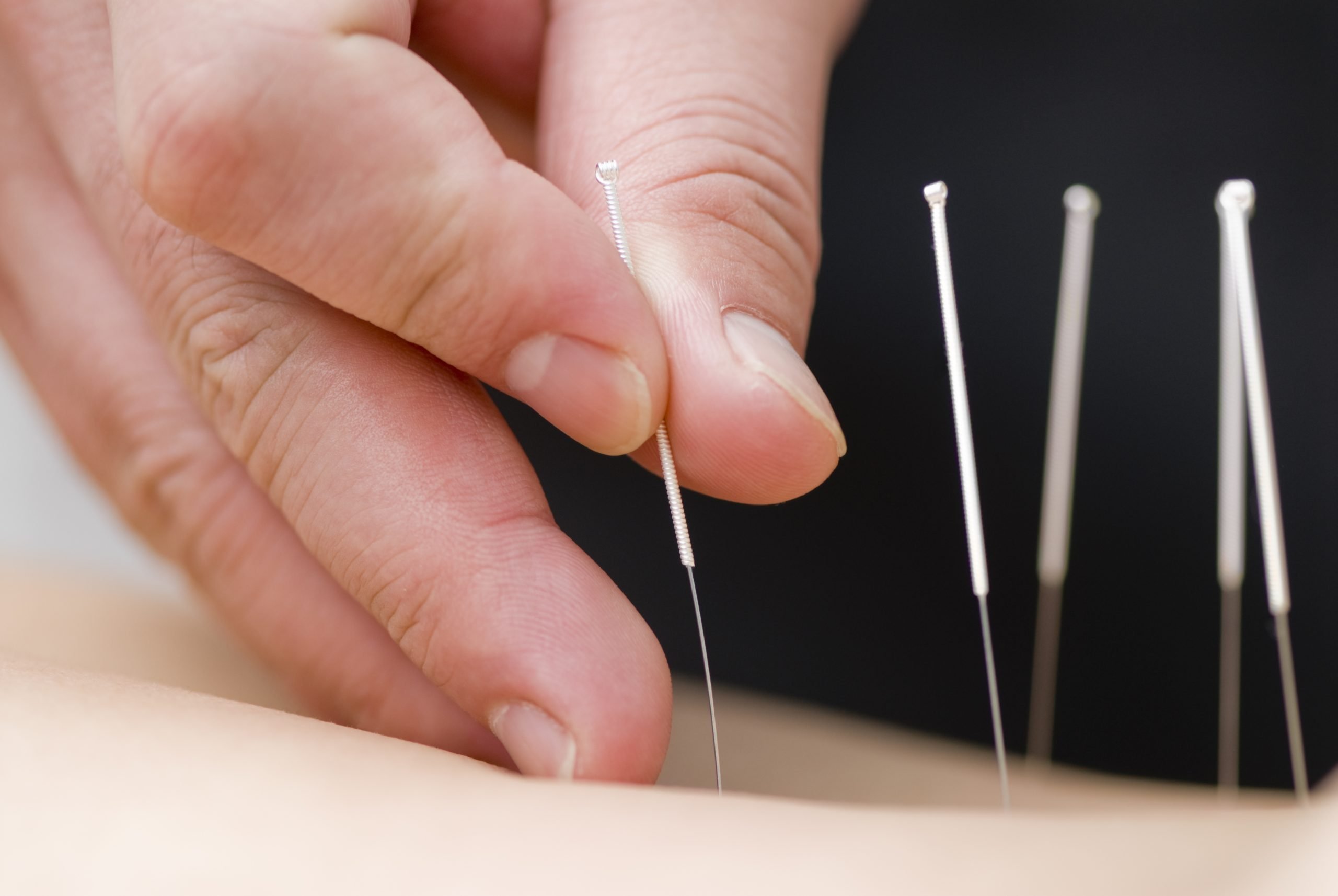
Page Contents
Hair loss is not something that anyone wants to experience. It is generally thought that hair loss is a problem that mostly plagues men but that simply isn’t true. Women struggle with hair loss like men do but some of the reasons for their loss may be different.
The most common triggers of hair loss in women can not be narrowed down to just one or two things. There are many things that can actually cause the hair loss that women experience at different times in their lives. But the top triggers will be discussed in more detail later in this post.
- Medications
- Genes
- Hormones
- Birth Control
- Stress
- Anemia
- Thyroid Abnormalities
Along with the main triggers of women’s hair loss, there are types of hair loss. There are only two different types of hair loss but the difference really does matter when it comes to how to treat the loss. Keep reading to find out what the types of hair loss are as well as the triggers that many women experience.

Types of Hair loss
When talking about hair loss in women you really need to understand the different types of hair loss that they can experience. The two types are very different in nature and will determine the method of treatment as well as what can actually be done longterm.
Genetic
It is possible, and maybe even likely, that you suffer from genetically predisposed hair loss. This is different from the next type we are going to talk about. So what does genetic loss look like? Will you wake up one day with no hair? No, it probably won’t be that dramatic if your genes are truly the cause.
Genetic loss is more of a gradual thinning but we will talk more about that later.
Reactive
If you have a reactive hair loss condition that means that something other than genes has caused the issue. There could be many things that cause reactive loss. Something simple like medication or something a little more complicated like stress or illness could cause it.
The really great thing about having reactive hair loss instead of genetic hair loss is that if something caused the loss then stopping something may halt the loss. Or if that doesn’t work then there is likely to be something that a professional can do to help you keep the hair you have and regrow what you have lost.
Causes of Women’s Hair loss

Talking about the types of hair loss in women is beneficial when you are struggling to understand what has been happening to your hair. It can also help with a course of action but it is just the first step. Once you know the types you need to know the potential causes of hair loss you or someone you know may be experiencing.
We are going to be focusing on seven main triggers of hair loss in women but this is not an exhaustive list. There are many other triggers that could cause hair loss but these are some of the more common reasons.
If you aren’t sure what the problem could be but definitely know that there is one then we encourage you to visit your doctor for some more specific answers.
Medications
Sadly some of the solutions to other health conditions you may have could cause hair loss. We know that doesn’t sound great but it is true. There are medications with the side effect of hair loss. If you have started a new medication recently and notice that it coincides with hair loss then you may want to visit with the prescribing physician.
There may be another medication that will work for your condition that doesn’t have that side effect. A medication-induced hair loss is a reactive type of loss and should not be permanent if you change medications.
Genes
We touched on this a little bit above because genes are not just a trigger but also there very own type of hair loss. There isn’t a lot that can be down about genes but there are some hair treatments that may help.
Genetic hair loss is typically a slow burn. You might notice some thinning over time that eventually turns into a bald spot or extremely thin hair. Lacking volume is a sign that the loss is becoming an issue and maybe the first time you even notice.
This might be the time to talk to your family members that you are close to on both sides to find out if there is anything they have done to help the loss. Also, if you aren’t sure there is a genetic issue but suspect it is, then have a chat with your parents or closest relative about it to find out.
Hormones
Hormones are good and bad. When your hormones are balanced and blissful then everything in your body is likely to be functioning properly. But when there is a small imbalance things start to go haywire and your hair can’t escape.
When your hair and skin are having chronic issues then you might want to head to your doctor’s office for a hormone check. There are, however, times in your life that your hormones are going to change and it will affect your hair. There is just no way around it.
Women go through major hormone changes during pregnancy and childbirth. This is a time that you will notice changes in your hair. During the pregnancy, it is likely that your hair will become thick and beautiful with very little loss. Once the baby is born, you will go through a time of hormone rebalancing. This will cause your hair to thin dramatically. You might actually think you will go bald. You won’t but your hair will look more like it did during pregnancy as long as your hormones rebalance correctly.
Another time when your hormones will fluctuate and that is during menopause. Women see some hair thinning and sometimes major loss during this time because their hormones are dropping. This may work itself out as the hormones find a new normal after menopause but you also may need some help from your doctor.
Birth Control
Birth control can be good for so many things and typically there are few side effects. However, if you end up changing birth control pills or methods there could be a shift in your hormones that will cause some hair loss or thinning.
This is a condition that can be handled sometimes by just switching back to the original method or stopping hormonal birth control altogether. However, that is something that you and your doctor need to discuss before a decision is made.
Stress
Stress can damage your body in so many ways and your hair is no exception. Losing your hair due to stress can actually cause more stress. Which can turn into a vicious cycle of stress and hair loss.
The way this happens is by causing the androgen levels in your body to rise. That is something that causes hair loss. Also, stress can cause other disruptions in the body such as sleep issues and lack of appetite. All of these things can and do affect your hair.
This issue can be pretty simple to take care of as long as you can manage your stress levels with some helpful coping mechanisms. But it may be something that you need to visit with your doctor about to really see some lasting results.

Anemia
Anemia, or low iron levels, in the body will cause some issues with different systems in your body. Besides causing fatigue, easy bruising, nail problems, and skin issues, it can also cause hair loss in women.
This is extremely common in women and may actually be one of the most common causes of hair loss in women. Iron is the main component in the production of hair cells. If you don’t keep your iron levels up then it is true that your hair production and retention will suffer.
Iron supplements or even something as simple as a multivitamin could really help you take care of this problem. If you don’t have any other symptoms of anemia then this may not be the cause, however if you are suffering from bruising and fatigue then it wouldn’t hurt to head to your pharmacy for an iron pill.
If it turns out that your anemia is more severe than what an over the counter pill can help then you need to see your doctor. There are stronger supplements that can help and they can also check for underlying causes of the anemia for a more longterm solution.
Thyroid Abnormalities
Your thyroid can be a culprit when it comes to hair loss. If your thyroid is overactive or underactive then it is likely that you are seeing some hair loss or thinning. Your thyroid actually has a lot of responsibility when it comes to protein and tissue production in your body.
If it is not working appropriately then it will absolutely affect your hair. This is something that has to be diagnosed by a doctor so if you have your suspicions then go get checked out. There are medications that can help as well as some dietary changes that may make a difference.
Conclusion
Hair loss is not something that is great to experience. No one wants to style their hair to cover up a bald spot or wear a hat or hair tie to cover up the loss. There are solutions to the problem and knowing the cause is half of the battle.
If you have concerns about your hair loss then make an appointment and go see your doctor. There may be some answers that you haven’t thought of yet that will make a huge difference in your hair.






